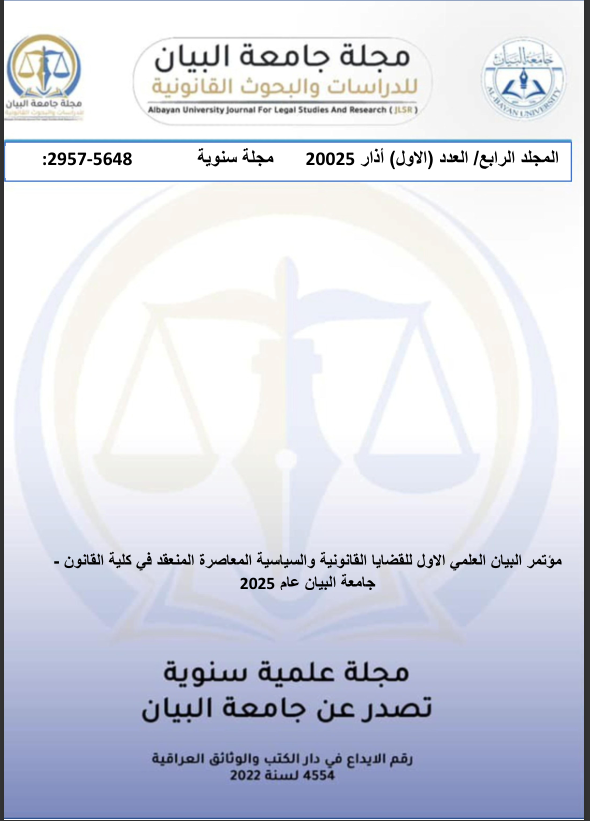Integrity and its role in combating administrative corruption
DOI:
https://doi.org/10.65263/47qp3m42Keywords:
Administrative corruption - integrity - investigating judge - financial control bureauAbstract
Corruption is a widespread global phenomenon with roots that take on broad dimensions and are involved in various factors that are difficult to distinguish between It has existed since ancient times, not just in this era Almost every society, whether ancient or modern, is free of it, and corruption will be the most important challenge that governments and societies will find themselves facing and fighting against. Corruption as a term includes a wide range of suspicious and questionable political, economic, administrative and financial practices. Corruption may be financial or administrative. But both are intertwined and intertwined, and there is no difference between them. Both are corruption, as administrative error leads to financial error. Financial error results in administrative error. It is a complex phenomenon with complex causes, diverse effects, and includes different forms and patterns. Promoting and spreading the values and principles of integrity and achieving loyalty and belonging between the individual and the state, It is noted that the law is not the only deterrent to corruption. Rather, there must be a culture of integrity and preserving public money. It is necessary to identify the supervisory authorities represented by the responsibility of the official authorities in the state, the independent supervisory institutions, and the means supporting the supervisory bodies to spread and disseminate the culture of integrity and combating corruption in society.
References
First: Books
1. Baha Zaki Mohammed: Administrative Corruption: Its Forms, Causes, and Remedies, Office of the Inspector General, Ministry of Oil, Baghdad, 2007.
Second: Constitutions
1. The Iraqi Constitution of 2005 (currently in force).
Third: Laws
1. Law No. (6) of 1990 (as amended).
2. Organic Law No. (55) of 2004.
3. Order No. (77) of 2004 concerning the Financial Audit Bureau, which refers to it as the Supreme Audit Institution in Iraq.
4. Order No. (57) of 2004 issued by the now-dissolved Coalition Provisional Authority.
5. Integrity Commission Law No. (30) of 2011 (currently in force).
Fourth: Research Papers and Articles
1. Ihsan Ali Abdulhussein, The Role of Oversight Bodies in Combating Corruption, a research paper submitted to the Integrity Commission, Department of Legal Affairs / Research and Studies Section, undated.
2. Azhar Abdullah Hassan Al-Hayali, The Impact of Administrative Corruption on Human Rights and Society, published in the Journal of the College of Law and Political Science, University of Kirkuk, October 2017.
3. Jassim Al-Saghir, Administrative Corruption: Its Negative Effects and Its Hindrance to Democratic State-Building, an article published on the website of Al-Fayhaa TV Channel.
4. Rahim Al-Ugaili, Corruption: Definition, Causes, Effects, and Means of Combating It, a research paper published by the House of Wisdom – Baghdad.
5. Adnan Qadir Aref Zangana, Administrative Corruption in Iraq: Causes and Remedies, published in the Journal of the College of Law and Political Science, University of Kirkuk, Vol. 3, Issue 11, 2014.
6. Mohammed Ismail et al., The Criminal Jurisdiction of the Integrity Commission in Iraq, published in a peer-reviewed journal issued by the University of Babylon, 2010.
7. Yasser Khalid Barakat Al-Waeli, Administrative Corruption: Its Concept and Causes, an article available on the Internet – Al-Naba Magazine, Issue 80, January 2006.
Fifth: Theses and Dissertations
1. Saad Fari Shanikher: Multiplicity of Oversight Bodies and Their Role in Detecting and Reducing Administrative Corruption (PhD Dissertation), submitted to the Higher Institute for Financial and Accounting Studies, University of Baghdad, 2010.
Sixth: Websites
1. Wikipedia, The Free Encyclopedia, ar.wikipedia.org (Last visited: 15/11/2024).
2. Ali Abdulhussein Mohsen, Explanation of the Integrity Commission Law, a research paper published on the official website www.nazaha.iq (Last visited: 18/11/2024).
Downloads
Published
Issue
Section
License
The authors retain Full copyright of their published article
Al-Bayan University Journal for Legal Studies and Research (AUJLSR) applies the Creative Commons Attribution 4.0 International (CC BY 4.0) License to articles and other works we publish. If you submit your paper for publication by AUJLSR, you agree to have the CC BY 4.0 license applied to your work.
Articles can be read and shared for under the following conditions:
BY: Attribution must be given to the original source (Attribution)
Full details available at
https://creativecommons.org/licenses/by/4.0/



